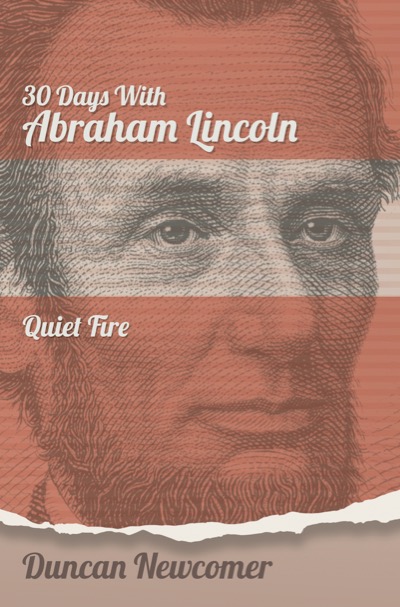By DUNCAN NEWCOMER
Author of 30 Days with Abraham Lincoln: Quiet Fire

This is the book that participants in the 2023 Braver Angels conference will see displayed at the bookstore, this week. Click on this cover image to visit the book’s Amazon page.
My heart is with the Braver Angels convention in Gettysburg this week. Over 600 people in this growing movement are meeting to extend their many programs to de-polarize American politics and practice.
They chose Gettysburg, because—as Lincoln’s Address explains—the Union victory there was the re-birth place of America. Much of the success of the Braver Angel movement comes from its Lincoln inspiration. The group originally was named Better Angels after the words from Lincoln’s First Inaugural Address. Because another group already had claimed that name, they changed to Braver Angels.
Gettysburg speaks volumes as to how this is a home base for both teams, the red team and the blue team, and the convention is equally represented.
I have encouraged Braver Angels since their inception. Among my connections, beyond Lincoln, I was a Marriage and Family Therapist for many years trained in the very same perspectives and techniques used by Braver Angels. One of the Braver Angels co-founders is Bill Doherty, who created the Braver Angels approach to workshops. Bill is a Professor and Director of the Minnesota Couples on the Brink Project in the Department of Family Social Science at the University of Minnesota. Just as I have throughout my life, Bill combines a background in family therapy and community engagement.
If you would like to learn more about Braver Angels, check out:
- The main website at https://braverangels.org/
- The 2023 conference summary.
- Or the group’s mission statement or leadership roster.
Looking to Lincoln may inspire us to compassionately look toward our neighbors
Here is what I’m doing to help in this movement toward compassionate reconnection with our neighbors.
While I was not able to attend the conference, this year, my contributions to the gathering include making sure that my 30-day book on Lincoln’s wisdom is present for conference participants in the bookstore. I also sent out an invitation to writers I’ve worked with over the years to send stories for this special issue of ReadTheSpirit magazine that coincides with the conference schedule.
The magazine’s Editor David Crumm suggested that we start this collection of columns with two of my own columns about Lincoln to set the stage for this array of reflections.
What were Lincoln’s hopes? In the first of those columns, which originally was broadcast over public radio in Maine, I invite listeners and readers to look at the courage and hope Lincoln brought to his First Inaugural, including the appeal to all Americans: “If I can have the same generous cooperation of the people of this nation, I think the flag of our country may yet be kept flaunting gloriously.”
What were Lincoln’s core values? In the second of those columns, we explore Lincoln’s core values, which mirror almost universally held values that Americans continue to share. In this column, you will find touchstones for bridging gaps you may find in your own community.
Then, other writers have contributed the following reflections on the many ways Lincoln’s legacy can help us become “better angels,” today:
Journalist and author Bill Tammeus writes about how Abraham Lincoln’s Gettysburg Address still calls us to reach out to one another.
Journalist and author Martin Davis asks: Are our battle-scarred American roads capable of carrying us toward unity?
Author and leadership coach Larry Buxton writes about: Growing up and growing wise with Abraham Lincoln
Columnist and editor Judith Pratt recalls: Hearing our Civil War stories shared generation to generation.
Attorney and community activist Mark Jacobs writes about: How Lincoln’s astonishing resilience and perseverance inspires me today

